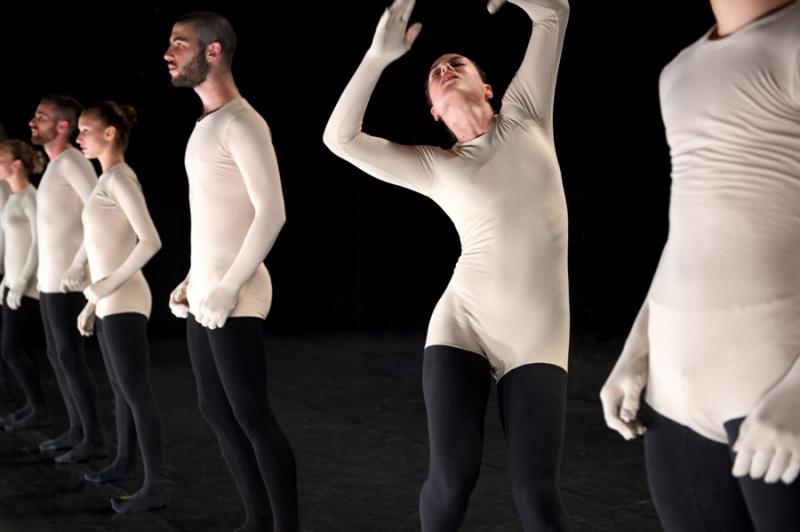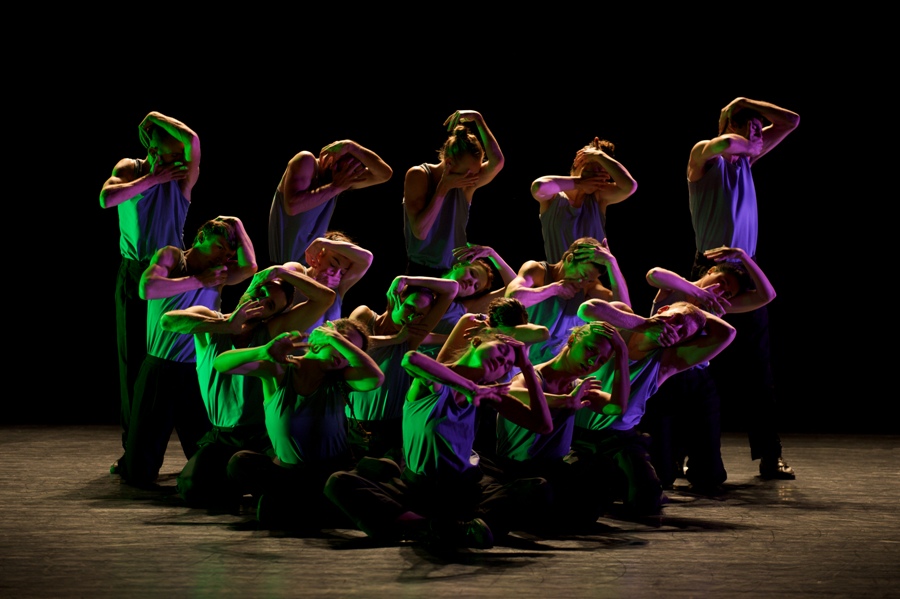Batsheva Ensemble, Sadler's Wells | reviews, news & interviews
Batsheva Ensemble, Sadler's Wells
Batsheva Ensemble, Sadler's Wells
Young dancers from Israel - and elsewhere - entertain against a backdrop of mild commotion

Batsheva Dance Company is reaching its half-century, which makes it, as one of the world’s leading dance brands, not quite as old – or as young – as Israel, but Martha Graham helped launch it several years before the 1967 Six Day War. An international mix, it is in fact two companies, the senior one and the Ensemble, currently touring Britain and made up of youngsters who might or might not graduate to the main, Tel Aviv-based troupe.
Naharin’s choreography is inventive, funny, self-interrogative, extrovert: like his country. He is neither especially political nor especially experimental. His dance is lithe and shimmering, always easy to watch, rarely teleological. He works with a language called “gaga”, which is a little unfortunate because of the (much more recent) pop-star’s name and offensive, if now slightly secondary, associations with an elderly person who makes no sense. Severe critics might claim that the latter is precisely analogous to what goes on on a Naharin-spattered stage, but I think that’s extreme. One of his more interesting rules is that dancers don’t rehearse, ever, with mirrors. They look inside themselves, a lot. They improvise. They guess. That’s gaga, partly.
Security checks at the start meant the show went up half an hour late
Deca Dance, which is what we’re being offered in London and which has already stormed Edinburgh, Salford, Bradford and one or two other points north and south, is a pot-pourri of excerpts celebrating Naharin since he took over Batsheva. A crowd-pleasing clown male soloist before lights down expands - in due time (on press night) - in to the full troupe stretching and zinging in alphabet shapes. The girls march around athletically testing their bendiness. Five barechested boys in skirts conduct a biblical, homoerotic parable with a bucket of mud.
“Hateful rubbish,” scoffed a famous ballet critic, behind me, at the end of the interval. Strange: he’s known to love hip hop. There are more than strains of that idiom's galvanic abandon and self-expression in what Naharin gets his dancers to do. Lots of it is sex and rock and roll. But at least this man was talking about the performance. “Free Palestine!” Sorry, did I say Israel? I did. There were two interruptions in the first half, one in the second, all from somewhere high up in the auditorium. House lights up; mild commotion; applause from the audience - in support I sensed first time round, then, latterly, ironically. The dancers are used to it. They are not warriors. They are easy targets, though for nothing more than words of expected anti-Israel anger: security checks at the start for anything more harmful meant the show went up half an hour late. With all the protest, pro and con, outside Sadler's Wells and the stage action inside, it was quite an evening. The best part of it was - and this is a punchline irony (and a bit of a spoiler, so I'll skip the detail) - the most Jewish: the ensemble dressed, parodically, in Hasidic uniform, engaging, putting it very mildly, with the audience.
With all the protest, pro and con, outside Sadler's Wells and the stage action inside, it was quite an evening. The best part of it was - and this is a punchline irony (and a bit of a spoiler, so I'll skip the detail) - the most Jewish: the ensemble dressed, parodically, in Hasidic uniform, engaging, putting it very mildly, with the audience.
The episode won't have calmed the protesters. Most of them had probably left by then; and there are, anyway, more pressing, shocking things currently to be angry about and shout about in the Israel-Palestine catastrophe. Batsheva is just a dance company. In this reaching-out gesture, as in others, it knows how to woo, and move, and entertain, like the best of them.
Explore topics
Share this article
Add comment
The future of Arts Journalism
You can stop theartsdesk.com closing!
We urgently need financing to survive. Our fundraising drive has thus far raised £33,000 but we need to reach £100,000 or we will be forced to close. Please contribute here: https://gofund.me/c3f6033d
And if you can forward this information to anyone who might assist, we’d be grateful.

Subscribe to theartsdesk.com
Thank you for continuing to read our work on theartsdesk.com. For unlimited access to every article in its entirety, including our archive of more than 15,000 pieces, we're asking for £5 per month or £40 per year. We feel it's a very good deal, and hope you do too.
To take a subscription now simply click here.
And if you're looking for that extra gift for a friend or family member, why not treat them to a theartsdesk.com gift subscription?
more Dance
 Help to give theartsdesk a future!
Support our GoFundMe appeal
Help to give theartsdesk a future!
Support our GoFundMe appeal
 Nutcracker, English National Ballet, Coliseum review - Tchaikovsky and his sweet tooth rule supreme
New production's music, sweets, and hordes of exuberant children make this a hot ticket
Nutcracker, English National Ballet, Coliseum review - Tchaikovsky and his sweet tooth rule supreme
New production's music, sweets, and hordes of exuberant children make this a hot ticket
 Matthew Bourne's Swan Lake, New Adventures, Sadler's Wells review - 30 years on, as bold and brilliant as ever
A masterly reinvention has become a classic itself
Matthew Bourne's Swan Lake, New Adventures, Sadler's Wells review - 30 years on, as bold and brilliant as ever
A masterly reinvention has become a classic itself
 Ballet Shoes, Olivier Theatre review - reimagined classic with a lively contemporary feel
The basics of Streatfield's original aren't lost in this bold, inventive production
Ballet Shoes, Olivier Theatre review - reimagined classic with a lively contemporary feel
The basics of Streatfield's original aren't lost in this bold, inventive production
 Cinderella, Royal Ballet review - inspiring dancing, but not quite casting the desired spell
A fairytale in need of a dramaturgical transformation
Cinderella, Royal Ballet review - inspiring dancing, but not quite casting the desired spell
A fairytale in need of a dramaturgical transformation
 First Person: singer-songwriter Sam Amidon on working in Dingle with Teaċ Daṁsa on 'Nobodaddy'
Michael Keegan-Dolan’s mind-boggling total work of art arrives at Sadlers Wells this week
First Person: singer-songwriter Sam Amidon on working in Dingle with Teaċ Daṁsa on 'Nobodaddy'
Michael Keegan-Dolan’s mind-boggling total work of art arrives at Sadlers Wells this week
 Akram Khan, GIGENIS, Sadler’s Wells review - now 50, Khan returns to his roots
The dancer-choreographer goes epic in a show that unites South Asian dance styles
Akram Khan, GIGENIS, Sadler’s Wells review - now 50, Khan returns to his roots
The dancer-choreographer goes epic in a show that unites South Asian dance styles
 Maddaddam, Royal Ballet review - superb dancing in a confusing frame
Wayne McGregor's version of Margaret Atwood's dystopia needs a clearer map
Maddaddam, Royal Ballet review - superb dancing in a confusing frame
Wayne McGregor's version of Margaret Atwood's dystopia needs a clearer map
 Pina Bausch’s The Rite of Spring/common ground[s], Sadler’s Wells review - raw and devastating
Returning dancers from 13 African countries deliver celebrated vision with blistering force
Pina Bausch’s The Rite of Spring/common ground[s], Sadler’s Wells review - raw and devastating
Returning dancers from 13 African countries deliver celebrated vision with blistering force
 Legacy, Linbury Theatre review - an exceptional display of black dance prowess
An all-too-fleeting celebration of black and brown ballet talent that demands a reprise
Legacy, Linbury Theatre review - an exceptional display of black dance prowess
An all-too-fleeting celebration of black and brown ballet talent that demands a reprise
 National Ballet of Canada, Sadler's Wells review - see this, and know what dance can do
Yet again, Crystal Pite proves herself a ferocious creative force, alongside fellow Canadian exports James Kudelka and Emma Portner
National Ballet of Canada, Sadler's Wells review - see this, and know what dance can do
Yet again, Crystal Pite proves herself a ferocious creative force, alongside fellow Canadian exports James Kudelka and Emma Portner

Comments
Well after both Anne Teresa